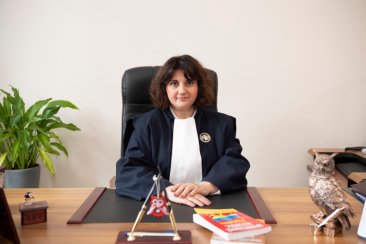Contact center of the Ukrainian Judiciary 044 207-35-46

Understanding and observance of the provisions of the Convention for the Protection of Human Rights and Fundamental Freedoms are important in prosecutorial activities, as the prosecutor, as well as the investigating judge, supervises the observance of the law in the activities of pre-trial investigation bodies, authorises certain decisions and actions of the investigator, etc. This was stated by Oleksandra Yanovska, Supreme Court Judge of the Criminal Cassation Court, during a training session for newly appointed prosecutors.
The judge spoke about the principles enshrined in Articles 6 (Right to a Fair Trial) and 8 (Right to Respect for Private and Family Life) of the Convention, citing the judgments of the European Court of Human Rights.
In particular, Oleksandra Yanovska emphasised that a court's failure to comply with the provisions of domestic law relating to the organisation and powers of the judiciary usually entails a violation of Article 6(1) of the Convention. She explained that in the light of this article, the criteria for an independent court are the manner of appointment and duration of the mandate of its members, the existence of protection from external pressure and the appearance of independence. The impartiality of a court is usually defined as the absence of bias or preconceived opinions and can be assessed in different ways.
In addition, the speaker focused on such concepts as ‘reasonable time’, ‘finality of court decisions’, ‘principle of presumption of innocence’ as one of the elements of a fair trial in criminal proceedings within the meaning of Article 6 of the Convention. She also emphasised the need to maintain a fair balance (equality of the parties) and adversarial proceedings during the trial, which means that the parties have the opportunity to know and comment on all components of the evidence and all comments submitted to influence the court's decision.
Regarding access to the case file, the judge explained that according to the ECHR, unrestricted access to the case file and unrestricted use of any notes, including the possibility of obtaining copies of relevant documents, if necessary, are significant guarantees of a fair trial. In addition, the accused has the right to legal assistance that is ‘practical and effective’ rather than ‘theoretical and illusory’ under Article 6(3) of the Convention.
Another issue that Oleksandra Yanovska focused on was the interrogation of witnesses. In the light of Article 6 of the Convention, the procedure and grounds for witnesses should be the same for the prosecution and the defence. Witnesses must be treated equally. The interrogation of a suspect must be conducted in compliance with the following principles: the right to remain silent; the right to interpretation; the right to the assistance of a lawyer.
As the speaker noted, problematic issues may arise with regard to the admissibility of evidence. Given the respect for human rights, only legally obtained evidence can be admissible.
Turning to the analysis of the requirements of Article 8 of the Convention, the judge emphasised the criteria for determining the legality of interference with the right to respect for private and family life. To establish the legality of such interference, the following questions must be answered:
- whether the interference is permitted by the domestic legal system of the country;
- whether the relevant legal provision is accessible to the citizen;
- whether the legal provision is sufficiently precise to allow a citizen to foresee (within reasonable limits) the possible consequences of his or her actions;
- whether the law provides sufficient guarantees against arbitrary interference with rights.
Regarding the requirement ‘necessary in a democratic society’, the speaker explained that it implies the pursuit of legitimate goals (e.g., national security, public order, protection of health and morals). It should be borne in mind that the measure applied must be proportionate to the aim it pursues, and the level of state intervention has legally regulated limits.
In addition to the right to respect for private and family life, Article 8 of the Convention guarantees the right to respect for home and correspondence. As Oleksandra Yanovska noted, the right to respect for correspondence covers all forms of communication with others (not only postal correspondence, but also telephone conversations, fax, e-mail, messengers, etc.)
The following procedural actions may potentially lead to a violation of Article 8 of the Convention: entry into a person's home or other property (Article 233 of the Criminal Procedural Code of Ukraine); search (Article 234 of the CPC of Ukraine); audio and video monitoring of a person (Article 260 of the CPC of Ukraine); inspection and seizure of correspondence (Article 262 of the CPC of Ukraine); surveillance of a person, thing or place (Article 269 of the CPC of Ukraine); processing and storage of personal information (Articles 259 and 266 of the CPC of Ukraine), etc.
The national legislation in this regard should be so clear as to provide an adequate understanding of the circumstances under which the authorities may resort to such measures, while avoiding arbitrary interference.
In conclusion, Oleksandra Yanovska noted that the justification of interference by public authorities with private and family life can be tested by means of a test, sequentially answering the following questions: whether there was an interference with private life under Article 8(1) of the Convention; whether the interference was justified under Article 8(2) of the Convention (whether the interference was lawful and pursued a legitimate aim); whether the interference was necessary in a democratic society and proportionate.
The event was held at the Training Centre for Prosecutors of Ukraine with the support of the Council of Europe project ‘Fostering human rights in the criminal justice system in Ukraine’.